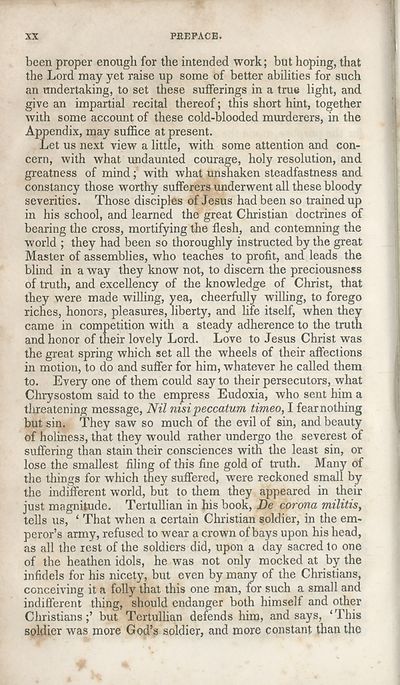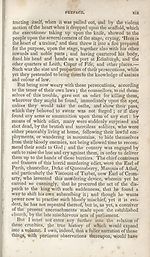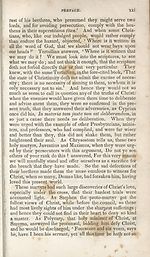Religion & morality > Cloud of witnesses, for the royal prerogatives of Jesus Christ, or, The last speeches and testimonies of those who suffered for the truth in Scotland, in the years 1681-1688, with an appendix, containing the Queensferry paper, Torwood excommunications, &c
(40)
Download files
Complete book:
Individual page:
Thumbnail gallery: Grid view | List view

XX
PREFACE.
been proper enough for the intended work; but hoping, that
the Lord may yet raise up some of better abilities for such
an undertaking, to set these sufferings in a true light, and
give an impartial recital thereof; this short hint, together
with some account of these cold-blooded murderers, in the
Appendix, may suffice at present.
Let us next view a little, with some attention and con¬
cern, with what undaunted courage, holy resolution, and
greatness of mind; with what unshaken steadfastness and
constancy those worthy sufferers underwent all these bloody
severities. Those disciples of Jesus had been so trained up
in his school, and learned the great Christian doctrines of
bearing the cross, mortifying the flesh, and contemning the
world ; they had been so thoroughly instructed by the great
Master of assemblies, who teaches to profit, and leads the
blind in a way they know not, to discern the preciousness
of truth, and excellency of the knowledge of Christ, that
they were made willing, yea, cheerfully willing, to forego
riches, honors, pleasures, liberty, and life itself, when they
came in competition with a steady adherence to the truth
and honor of their lovely Lord. Love to Jesus Christ was
the great spring which set all the wheels of their affections
in motion, to do and suffer for him, whatever he called them
to. Every one of them could say to their persecutors, what
Chrysostom said to the empress Eudoxia, who sent him a
threatening message, Nil nisipeccatum timeo, I fear nothing
but sin. They saw so much of the evil of sin, and beauty
of holiness, that they would rather undergo the severest of
suffering than stain their consciences with the least sin, or
lose the smallest filing of this fine gold of truth. Many of
the things for which they suffered, were reckoned small by
the indifferent world, but to them they appeared in their
just magnitude. Tertullian in his book, De corona militis,
tells us, ‘ That when a certain Christian soldier, in the em¬
peror’s army, refused to wear a crown of bays upon his head,
as all the rest of the soldiers did, upon a day sacred to one
of the heathen idols, he was not only mocked at by the
infidels for his nicety, but even by many of the Christians,
conceiving it a folly that this one man, for such a small and
indifferent thing, should endanger both himself and other
Christians;’ but Tertullian defends him, and says, ‘This
soldier was more God’s soldier, and more constant than the
PREFACE.
been proper enough for the intended work; but hoping, that
the Lord may yet raise up some of better abilities for such
an undertaking, to set these sufferings in a true light, and
give an impartial recital thereof; this short hint, together
with some account of these cold-blooded murderers, in the
Appendix, may suffice at present.
Let us next view a little, with some attention and con¬
cern, with what undaunted courage, holy resolution, and
greatness of mind; with what unshaken steadfastness and
constancy those worthy sufferers underwent all these bloody
severities. Those disciples of Jesus had been so trained up
in his school, and learned the great Christian doctrines of
bearing the cross, mortifying the flesh, and contemning the
world ; they had been so thoroughly instructed by the great
Master of assemblies, who teaches to profit, and leads the
blind in a way they know not, to discern the preciousness
of truth, and excellency of the knowledge of Christ, that
they were made willing, yea, cheerfully willing, to forego
riches, honors, pleasures, liberty, and life itself, when they
came in competition with a steady adherence to the truth
and honor of their lovely Lord. Love to Jesus Christ was
the great spring which set all the wheels of their affections
in motion, to do and suffer for him, whatever he called them
to. Every one of them could say to their persecutors, what
Chrysostom said to the empress Eudoxia, who sent him a
threatening message, Nil nisipeccatum timeo, I fear nothing
but sin. They saw so much of the evil of sin, and beauty
of holiness, that they would rather undergo the severest of
suffering than stain their consciences with the least sin, or
lose the smallest filing of this fine gold of truth. Many of
the things for which they suffered, were reckoned small by
the indifferent world, but to them they appeared in their
just magnitude. Tertullian in his book, De corona militis,
tells us, ‘ That when a certain Christian soldier, in the em¬
peror’s army, refused to wear a crown of bays upon his head,
as all the rest of the soldiers did, upon a day sacred to one
of the heathen idols, he was not only mocked at by the
infidels for his nicety, but even by many of the Christians,
conceiving it a folly that this one man, for such a small and
indifferent thing, should endanger both himself and other
Christians;’ but Tertullian defends him, and says, ‘This
soldier was more God’s soldier, and more constant than the
Set display mode to:
![]() Universal Viewer |
Universal Viewer | ![]() Mirador |
Large image | Transcription
Mirador |
Large image | Transcription
| Permanent URL | https://digital.nls.uk/132216119 |
|---|
| Description | Thousands of printed books from the Antiquarian Books of Scotland collection which dates from 1641 to the 1980s. The collection consists of 14,800 books which were published in Scotland or have a Scottish connection, e.g. through the author, printer or owner. Subjects covered include sport, education, diseases, adventure, occupations, Jacobites, politics and religion. Among the 29 languages represented are English, Gaelic, Italian, French, Russian and Swedish. |
|---|

